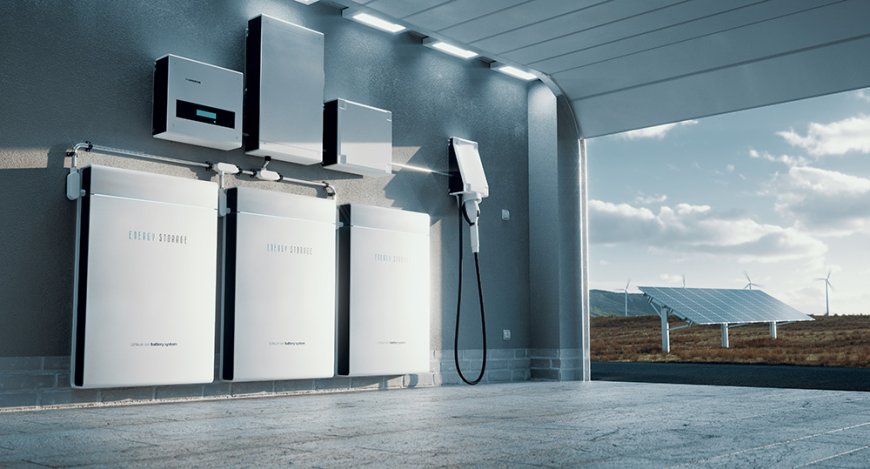The Growing Market for Residential Battery Storage
Batteries are becoming increasingly common in homes as a way for homeowners to store energy from renewable sources like solar panels.

Batteries are becoming increasingly common in homes as a way for homeowners to store energy from renewable sources like solar panels. As battery technology advances, home battery storage is emerging as an affordable option that provides homeowners with benefits like back-up power and energy independence. Let's explore how home battery storage works and the advantages it offers.
How Home battery Storage Works
Home batteries work by storing excess energy generated by a home's solar panels or other renewable energy systems. During the day when solar panels are generating power, any excess electricity beyond what the home is using gets diverted to charge the battery storage system. The battery then holds this stored energy until it is needed later, such as in the evening when solar energy is no longer available.
Some battery systems are installed along with solar panels, while others can be added as a standalone system for homes that already have solar. The battery is connected to the home's electrical panel or inverter so that it can discharge the stored power back into the home's wiring as needed. An energy management system monitors the battery levels and controls the flow of energy between the battery, solar panels, and home's electrical loads.
Benefits of Energy Independence
One of the biggest benefits of Residential Battery storage is that it allows homeowners to power their homes using energy they produce and store themselves. On sunny days, solar panels can fully power a home and charge the battery too. Then at nighttime or on cloudy days, the stored solar energy in the battery takes over to meet the home's power needs.
This provides homeowners with a high level of energy independence and resilience. No longer are they reliant on the power grid if the electricity goes out. The battery backup keeps critical loads like lights, appliances, Wi-Fi running. It gives homeowners peace of mind knowing they have a reliable backup power source at home.
Grid Support and Savings Potential
Utility providers are increasingly offering programs where home battery owners can provide backup power services to the grid during times of high demand. By discharging stored solar power back to the grid at strategic times, homeowners get paid for the grid support.
Besides backup power revenue, battery storage reduces home energy costs by shifting excess solar power to evenings and other high rate price periods. It maximizes the value homeowners get from their solar investment. Studies show coupling batteries with solar can decrease electric bills by 30-50% depending on local electricity rates. Over the life of the system, savings potential adds up significantly.
Environmental Benefits of Batteries
In addition to economic benefits, Residential Battery have advantages for the environment too. They provide a way for homeowners to make more use of the clean, renewable energy their solar panels produce each day. Any excess solar that would normally get wasted or sent needlessly to the grid gets stored in the battery for later use at home instead.
This reduces the amount of power homes need to draw from the traditional utility grid. As more homes deploy battery storage, it lessens demand on power plants that run on fossil fuels like natural gas. On larger scales, batteries integrated into the electric grid could help boost adoption of renewable energy sources by storing energy on days of excess supply for use when renewable production is low. The environmental impact is fewer emissions from less fossil fuel burning.
Challenges and Safety Considerations
As with any new technology, there are some challenges and considerations with home battery storage today. Upfront installation costs remain high - starting around $10,000 without any incentives factored in. However, prices are expected to fall significantly over the next 5-10 years as manufacturing scales up.
For homeowners interested in adopting batteries, safety should be top of mind. Leading battery manufacturers have sophisticated built-in controls and cooling mechanisms to prevent overheating. But homeowners still need to choose a reputable brand and installer to maximize safety. Proper ventilation and locating the battery in an appropriate indoor or outdoor space away from flammables is also important.
With battery technology advancing rapidly, many expect these initial challenges around costs and safety to diminish over time. As performance increases while prices decrease, expect Residential Battery energy storage to become a mainstream green energy solution for more homes in the coming decade. Its merits of energy independence, grid assistance, and environmental benefits will drive steady growth in this promising clean technology market.
Get more insights on Residential Battery
For Deeper Insights, Find the Report in the Language that You want
About Author:
Money Singh is a seasoned content writer with over four years of experience in the market research sector. Her expertise spans various industries, including food and beverages, biotechnology, chemical and materials, defense and aerospace, consumer goods, etc.












